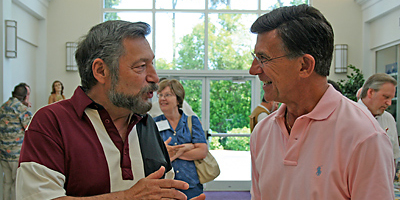
 MYRTLE BEACH—Encyclicals are an important part of the modern papacy. These writings by popes set forth their views on issues of morality facing the Catholic Church and the entire world.
MYRTLE BEACH—Encyclicals are an important part of the modern papacy. These writings by popes set forth their views on issues of morality facing the Catholic Church and the entire world.
Many people, however, never read the documents, and if they do, are sometimes bogged down by details and complex theological concepts. Permanent deacons from the diocese, and some of their wives, learned the basic concepts of these writings and how to apply them to their ministry at their Spring Continuing Day of Education, held May 22 at St. Andrew Church in Myrtle Beach.
Sister Pamela Smith, of the Sisters of Sts. Cyril and Methodius, led an extensive discussion of “The Pope’s Pen and Us: Major Themes of the Encyclical Letters of Pope Benedict XVI and Our Everyday Church and Society.” She is director of catechesis and Christian initiation for parishes and schools in the diocese.
Sister Pam told the crowd of more than 100 that the purpose of the day was to help them figure out “What does an encyclical have to do with the person in the pew?” She began with “Deus Caritas Est” (“God Is Love”), Pope Benedict XVI’s first encyclical, issued Dec. 25, 2005.
Sister Pam said many were surprised that it was so brief, its language direct. She said the pope felt called to write the encyclical “in response to movements that foster treachery and violence in the name of God.” The encyclical teaches that God’s love is encountered not just in an idea, but in the person of Jesus Christ.
“We need to pay attention to the uniqueness of the Christian message, which is the personal nature of our God, His love embodied in Jesus Christ, and the importance of the human person in the light of Christ,” she said.
One of the core messages of “Deus Caritas Est” is that love must be at the center of the work people do in the name of God. Sister Pam urged the deacons to rediscover their passion for the Gospel and to take time out for private prayer while they balance their vocation, jobs and family.
 “The world needs our sign of self-giving and determination to keep to lifelong commitments,” she said. “That’s not easy. We all know that. People need to see from us that we can be busy and productive and also value daily prayer time and quiet. That helps in maintaining our passion for God.”
“The world needs our sign of self-giving and determination to keep to lifelong commitments,” she said. “That’s not easy. We all know that. People need to see from us that we can be busy and productive and also value daily prayer time and quiet. That helps in maintaining our passion for God.”
Pope Benedict’s second encyclical, “Spe Salve” (“Saved in Hope”), issued in Nov. 2007, encourages Catholics to focus on the eternal hope represented by Christ’s resurrection and demonstrate it to others through charitable work and daily lives of faith.
“Hope says to us that no matter what, our lives are not going to end in emptiness and darkness,” she said. “Every positive act we make on behalf of the other, every liturgy, every prayer we offer is an act of performative hope.”
“Caritas in Veritate” (“Charity in Truth”), the pope’s third encyclical, was issued in June 2009. It addressed the world’s many problems, ranging from terrorism and crime to poverty, domestic violence and natural disasters. Pope Benedict stressed that God, through his love for every person and for all creation, enables us to seek truth and act upon it in daily life, Sister Pam said. The encyclical also defined the importance of the human person, uniquely made in God’s image and likeness.
Sister Pam said “Charity in Truth” focuses on the principle of gratuitousness, which states that God’s presence in our life is a gift that goes beyond mere generosity, and requires people to not only do works of charity, but strive to build a larger community united in God’s love.
“As we grow, our capacity to love should grow to love those who are most different from us,” she said. “That doesn’t mean we say whatever floats your boat is OK, but we ought to be able to connect on some human level with those the least like us,” Sister Pam said.
 The afternoon session included discussion on how important it is for people of faith to speak up against moral wrongs in the public arena. Participants also discussed how the deacons could use the message of the encyclicals in daily ministry especially for marginalized groups such as immigrants.
The afternoon session included discussion on how important it is for people of faith to speak up against moral wrongs in the public arena. Participants also discussed how the deacons could use the message of the encyclicals in daily ministry especially for marginalized groups such as immigrants.
“Sister Pam is such a good teacher because she took some serious theological concepts and formed a dialogue so we could not only understand hem, but learn how to apply them to our everyday life,” said Deacon Bill Lacombe of St. Peter Church in Beaufort.
Deacon Coleman Parks, of Corpus Christi Church in Lexington, said he was motivated to fully live out Catholic teachings on helping others.
“We talk about how being Catholic is about getting out and administerin to the needy and the poor,” he said. “I learned today that through oing that, we’re doing exactly what Christ’s whole life was about. Actions truly do speak louder than words.”
